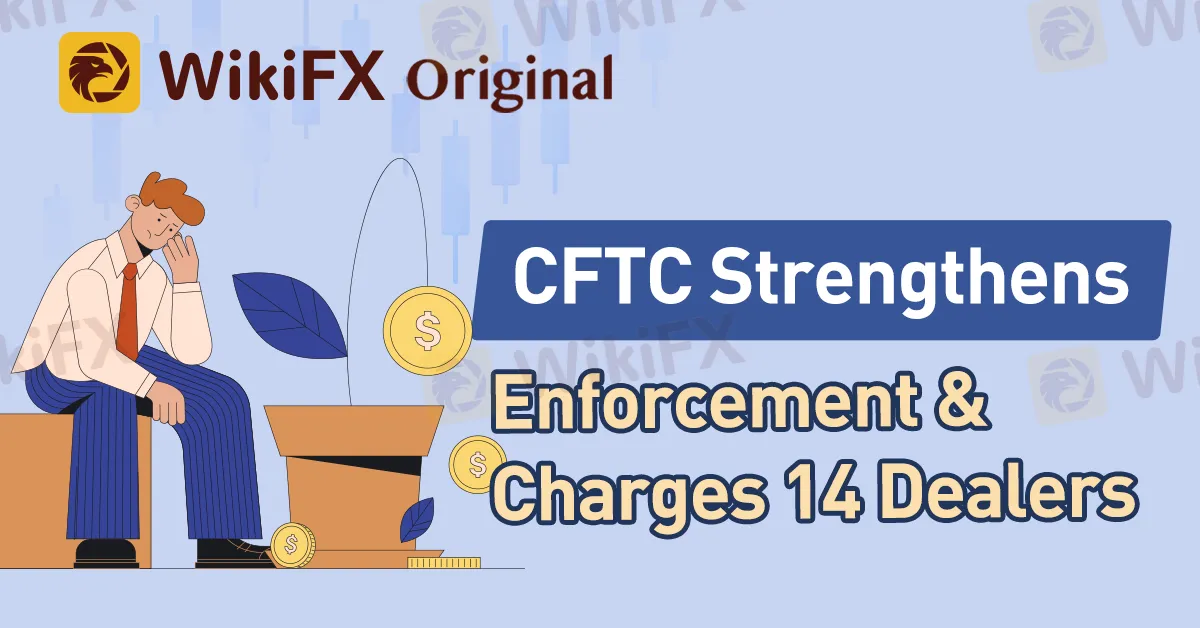简体中文
繁體中文
English
Pусский
日本語
ภาษาไทย
Tiếng Việt
Bahasa Indonesia
Español
हिन्दी
Filippiiniläinen
Français
Deutsch
Português
Türkçe
한국어
العربية
CFTC Strengthens Enforcement & Charges 14 Dealers
Abstract:14 retail foreign exchange dealers (RFEDs) and futures commission merchants (FCMs) have been charged by the Commodity Futures Trading Commission (CFTC) with falsely claiming to be registered with the organisation.

14 retail foreign exchange dealers (RFEDs) and futures commission merchants (FCMs) have been charged by the Commodity Futures Trading Commission (CFTC) with falsely claiming to be registered with the organisation.
The CFTC is a US government agency that regulates and oversees the futures and options markets. It aims to promote transparency, competitiveness, and efficiency in these markets, protect investors and the public from fraud, manipulation, and abusive practices. It was established in 1974 and is responsible for regulating a wide range of markets and activities, including agricultural commodities, energy and metals, financial derivatives, and virtual currencies. Its key functions include registering and regulating commodity futures brokers and dealers, monitoring market activity for fraud and manipulation, and enforcing laws and regulations related to the futures and options markets.
The charges were made public on Friday by the US derivatives market watchdog, which noted that the platforms give their addresses as being in the US, the UK, and Sweden.
The platforms in question are Cross Trade FX, Bit Block FXtrades, Bit Trading, Voltfxtrade, Fast Option Subdivision, and Garantitrademiness.com. The others include Sparkleswhite.com, Trust Pay Market, Instantearners247.com, TFX Trading, Betatradeoptions.com, Garantitrademinex.net, Prime Finance Network, and Garantitrademinex.net.
According to the CFTC, these platforms have been making fake claims to be registered FCMs and RFEDs since at least January this year. Simultaneously, they also claimed to be part of the National Futures Association (NFA) when they are actually not registered with the CFTC.
These 12 organisations assert that they share the same NFA Identification Number while the remaining two claimed to have a separate but similar NFA Identification Number.
The CFTC requested the Court to halt the operations of these platforms for breaking both its rules and those of the nations commodity exchanges.
Ian McGinley, the CFTC's Director of Enforcement, clarified that the regulators actions today has clearly demonstrated how the CFTC will be continuously and tenaciously safeguard consumers and increase market integrity.
Less than a month after charging Binance and its CEO Changpeng Zhao of running an unauthorised exchange for digital asset derivatives, the CFTC took action against the dealers. The watchdog also filed a lawsuit against Samuel Lim, the former chief compliance officer of Binance, and labelled the compliance procedure at the top exchange a “sham”. Zhao disputed the claims.
Since the start of 2023, the CFTC has clamped down on a number of Ponzi schemes involving currencies and cryptocurrencies. Three interrelated FX Ponzi scams totaling $145 million were busted by the derivatives market supervisor in February, defrauding over a thousand investors.
The watchdog also filed a lawsuit against a California-based business and its CEO at the beginning of the month for operating a $7 million cryptocurrency Ponzi scam. The hoax claimed to be utilising “Robot Traders” to trade with clients' digital assets and offered investors a daily return of at least 2.5%.

Disclaimer:
The views in this article only represent the author's personal views, and do not constitute investment advice on this platform. This platform does not guarantee the accuracy, completeness and timeliness of the information in the article, and will not be liable for any loss caused by the use of or reliance on the information in the article.
Read more

Financial Educator “Spark Liang” Involved in an Investment Scam?!
A 54-year-old foreign woman lost her life savings of RM175,000 to an online investment scam that promised high returns within a short timeframe. The scam was orchestrated through a Facebook page named "Spark Liang."

The Hidden Checklist: Five Unconventional Steps to Vet Your Broker
Forex broker scams continue to evolve, employing new tactics to appear credible and mislead unsuspecting traders. Identifying these fraudulent schemes requires vigilance and strategies beyond the usual advice. Here are five effective methods to help traders assess the legitimacy of a forex broker and avoid potential pitfalls.

Doo Financial Obtains Licenses in BVI and Cayman Islands
Doo Financial, a subsidiary of Singapore-based Doo Group, has expanded its regulatory footprint by securing new offshore licenses from the British Virgin Islands Financial Services Commission (BVI FSC) and the Cayman Islands Monetary Authority (CIMA).

CFI’s New Initiative Aims to Promote Transparency in Trading
A new programme has been launched by CFI to address the growing need for transparency and awareness in online trading. Named “Trading Transparency+: Empowering Awareness and Clarity in Trading,” the initiative seeks to combat misinformation and equip individuals with resources to evaluate whether trading aligns with their financial goals and circumstances.
WikiFX Broker
Latest News
AIMS Broker Review
The Hidden Checklist: Five Unconventional Steps to Vet Your Broker
YAMARKETS' Jingle Bells Christmas Offer!
Why is there so much exposure against PrimeX Capital?
Russia to Fully Ban Crypto Mining in 10 Regions Starting January 1, 2025
Two Californians Indicted for $22 Million Crypto and NFT Fraud
WikiFX Review: Is Ultima Markets Legit?
Colorado Duo Accused of $8M Investment Fraud Scheme
MTrading’s 2025 "Welcome Bonus" is Here
Malaysia Pioneers Zakat Payments with Cryptocurrencies
Currency Calculator


